Jackfruit (Artocarpus heterophyllus) is a tropical fruit that has gained popularity in recent years, not only for its unique taste and versatility in culinary applications but also for its numerous health benefits. This article explores the scientific evidence behind the positive effects of consuming jackfruit.
Rich in Nutrients
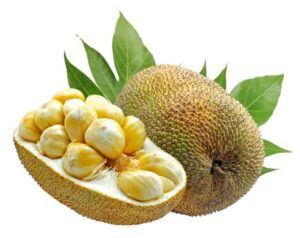 Jackfruit is a nutritional powerhouse, containing essential vitamins, minerals, and dietary fiber. It is a good source of vitamin C, potassium, and dietary fiber, which contribute to overall health and well-being. A study published in the International Journal of Current Research supports the nutritional value of jackfruit, highlighting its potential to meet daily nutrient requirements.
Jackfruit is a nutritional powerhouse, containing essential vitamins, minerals, and dietary fiber. It is a good source of vitamin C, potassium, and dietary fiber, which contribute to overall health and well-being. A study published in the International Journal of Current Research supports the nutritional value of jackfruit, highlighting its potential to meet daily nutrient requirements.
Antioxidant Properties
The fruit is packed with antioxidants, including flavonoids, carotenoids, and phenolic compounds. These antioxidants play a crucial role in neutralizing free radicals in the body, which are known to contribute to various chronic diseases. Research in the Journal of Agricultural and Food Chemistry suggests that the antioxidant activity of jackfruit may help protect cells from oxidative stress.
Moreover, the unique combination of flavonoids, carotenoids, and phenolic compounds found in jackfruit sets it apart as a potent defender against oxidative damage. Flavonoids, renowned for their anti-inflammatory effects, collaborate with carotenoids to bolster the body’s defense mechanisms. Additionally, the phenolic compounds present in jackfruit exhibit diverse health-promoting properties, acting as powerful scavengers of free radicals and contributing to the overall antioxidant synergy within this tropical fruit. This intricate interplay of specialized compounds not only underscores jackfruit’s exceptional antioxidant prowess but also highlights its potential as a natural source of multifaceted health benefits.
Anti-inflammatory Effects
Jackfruit contains compounds with anti-inflammatory properties, such as flavonoids and saponins. Chronic inflammation is associated with several health issues, including heart disease and arthritis. A study in the Asian Pacific Journal of Tropical Biomedicine indicates that jackfruit extracts exhibit anti-inflammatory effects, potentially reducing the risk of inflammatory-related diseases.
Continuing with the discussion on the anti-inflammatory effects of jackfruit, it’s noteworthy to emphasize the distinctive qualities of the compounds found in jackfruit that contribute to its anti-inflammatory properties. The flavonoids present in jackfruit, such as quercetin and kaempferol, are known for their potent antioxidant and anti-inflammatory actions. These compounds work synergistically to neutralize free radicals and modulate inflammatory pathways, potentially offering a comprehensive approach to mitigating inflammation-related diseases.
Furthermore, the saponins identified in jackfruit add another layer to its anti-inflammatory prowess. Saponins are bioactive compounds with diverse pharmacological effects, including anti-inflammatory and immune-modulating activities. Research suggests that these saponins may play a role in suppressing pro-inflammatory cytokines and enzymes, thereby contributing to the overall anti-inflammatory potential of jackfruit.
In summary, the anti-inflammatory effects of jackfruit extend beyond a general reduction in inflammation. The specific flavonoids and saponins found in jackfruit exhibit nuanced actions that target key inflammatory pathways, presenting a promising avenue for addressing health issues associated with chronic inflammation.
Weight Management
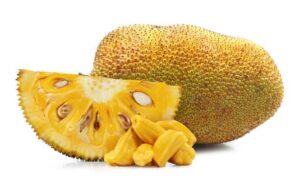 The high fiber content in jackfruit may aid in weight management. Dietary fiber promotes a feeling of fullness, reducing overall calorie intake. Additionally, the Journal of Medicinal Food reports that jackfruit may have anti-obesity effects, making it a potentially beneficial food for those looking to maintain a healthy weight.
The high fiber content in jackfruit may aid in weight management. Dietary fiber promotes a feeling of fullness, reducing overall calorie intake. Additionally, the Journal of Medicinal Food reports that jackfruit may have anti-obesity effects, making it a potentially beneficial food for those looking to maintain a healthy weight.
The fruit contains a mix of soluble and insoluble dietary fibers, such as pectin, which not only imparts a feeling of fullness but also aids in digestion and regulates bowel movements. This combination of fibers slows down the digestion and absorption of nutrients, promoting sustained satiety and reducing the likelihood of overeating.
Moreover, the presence of bioactive compounds like flavonoids and saponins in jackfruit adds another layer to its anti-obesity effects. These compounds have been studied for their potential impact on metabolic processes, including lipid metabolism and adipogenesis. Research suggests that they may play a role in modulating factors associated with obesity, presenting jackfruit as a promising dietary addition for those seeking effective and natural support in their weight management journey.
Blood Sugar Regulation
For individuals managing diabetes, jackfruit may be a valuable addition to their diet. Research published in the Journal of Ethnopharmacology suggests that certain compounds in jackfruit may have hypoglycemic effects, helping to regulate blood sugar levels.
Specifically, researchers have identified unique compounds in jackfruit, such as lectins, peptides, and saponins, which contribute to its hypoglycemic properties. These bioactive compounds appear to influence glucose metabolism by inhibiting enzymes involved in carbohydrate digestion and absorption.
Additionally, some studies propose that jackfruit may enhance insulin sensitivity, facilitating the cellular uptake of glucose. This multifaceted approach to blood sugar regulation highlights the intricate interplay of jackfruit’s components in potentially offering nuanced benefits for individuals navigating diabetes management.
Gut Health
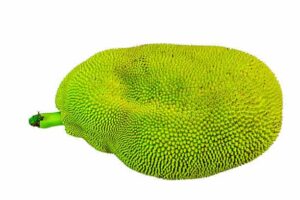 Jackfruit is an excellent source of dietary fiber, which promotes digestive health. Fiber aids in regular bowel movements and helps prevent constipation. A study in the journal Food & Function emphasizes the role of dietary fiber in maintaining a healthy gut microbiota, which is crucial for overall well-being.
Jackfruit is an excellent source of dietary fiber, which promotes digestive health. Fiber aids in regular bowel movements and helps prevent constipation. A study in the journal Food & Function emphasizes the role of dietary fiber in maintaining a healthy gut microbiota, which is crucial for overall well-being.
Jackfruit not only provides a generous dose of dietary fiber but also offers unique compounds that contribute to gastrointestinal well-being. The fruit contains prebiotics, specialized fibers that serve as a vital fuel source for beneficial gut bacteria. These prebiotics, such as fructooligosaccharides (FOS) and inulin, selectively stimulate the growth and activity of probiotics in the intestines.
Furthermore, jackfruit’s richness in polyphenols, including flavonoids and phytonutrients, adds an extra layer of digestive support. These compounds exhibit antioxidant and anti-inflammatory properties, creating an environment conducive to a balanced gut microbiome. As a result, the consumption of jackfruit not only promotes regularity and prevents constipation but also fosters a thriving community of beneficial microbes, contributing to a resilient and harmonious digestive system.
Cardiovascular Health
The nutrient composition of jackfruit, particularly its potassium content, contributes to cardiovascular health. Potassium helps regulate blood pressure by counteracting the effects of sodium. The American Heart Association recommends an increased intake of potassium for maintaining a healthy blood pressure, and jackfruit can be a natural and delicious way to achieve this.
The fruit is rich in phytochemicals, including flavonoids and antioxidants, which have been associated with improved heart health. These compounds may play a role in reducing oxidative stress and inflammation, both of which are linked to cardiovascular diseases. Including jackfruit in your diet not only provides essential minerals for blood pressure regulation but also introduces a spectrum of bioactive compounds that contribute to the overall well-being of the cardiovascular system.
Immune System Support
Vitamin C, a powerful antioxidant found in jackfruit, plays a crucial role in supporting the immune system. Adequate vitamin C intake is associated with a reduced risk of infections and a faster recovery from illnesses. Including jackfruit in the diet can contribute to overall immune system health.
Furthermore, the immune-boosting properties of jackfruit extend beyond its vitamin C content. The fruit contains an array of phytochemicals, such as flavonoids and carotenoids, which have been shown to possess anti-inflammatory and antiviral properties.
These compounds work synergistically with vitamin C to fortify the body’s defenses, helping to ward off infections and enhance the overall resilience of the immune system. Research suggests that the unique combination of antioxidants in jackfruit may provide a nuanced and comprehensive approach to immune system support, making it a valuable addition to a well-rounded, health-conscious diet.
Cancer Prevention
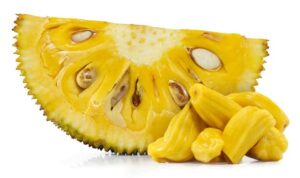 Some studies suggest that the phytochemicals and antioxidants in jackfruit may have anti-cancer properties. Research published in the International Journal of Oncology highlights the potential of jackfruit extracts in inhibiting the growth of cancer cells. While more research is needed, these findings suggest a promising avenue for further investigation.
Some studies suggest that the phytochemicals and antioxidants in jackfruit may have anti-cancer properties. Research published in the International Journal of Oncology highlights the potential of jackfruit extracts in inhibiting the growth of cancer cells. While more research is needed, these findings suggest a promising avenue for further investigation.
Furthermore, the unique composition of jackfruit compounds, including flavonoids, saponins, and other bioactive compounds, contributes to its anti-cancer potential. These compounds are believed to exert their effects through various mechanisms, such as inducing apoptosis (programmed cell death), inhibiting angiogenesis (the formation of blood vessels that support tumor growth), and preventing the proliferation of cancer cells. Understanding these specific actions may pave the way for targeted therapies and the development of novel anti-cancer interventions based on the natural compounds found in jackfruit.
Sustainable Food Source
Beyond individual health benefits, the cultivation and consumption of jackfruit contribute to environmental sustainability. Jackfruit trees are hardy and resistant to pests, requiring fewer pesticides and fertilizers. Additionally, the fruit has a high yield, providing a substantial amount of food per tree. As global concerns about food security and environmental impact grow, jackfruit presents itself as a sustainable and nutritious food source.
Moreover, the unique composition of compounds within jackfruit, including phytochemicals and antioxidants, enhances its eco-friendly profile. These natural compounds not only contribute to the fruit’s resilience against pests but also play a role in promoting soil health and biodiversity. The jackfruit tree’s ability to thrive in diverse climates further underscores its potential as a resilient and sustainable solution in the face of evolving agricultural challenges.
Improved Vision
Jackfruit contains essential nutrients like vitamin A, which is essential for maintaining healthy vision. Vitamin A plays a critical role in the function of the retina and is known to help prevent age-related macular degeneration (AMD).
Furthermore, jackfruit is a rich source of carotenoids, including lutein and zeaxanthin, which are vital for eye health. These compounds are known to accumulate in the retina, acting as natural antioxidants that help protect the eyes from oxidative stress.
Lutein and zeaxanthin specifically play a crucial role in filtering harmful high-energy light waves, such as ultraviolet rays, and are associated with a lower risk of developing cataracts and other vision-related disorders.
In combination with vitamin A, the unique blend of these vision-supporting compounds makes jackfruit a valuable addition to a diet aimed at maintaining optimal eye function and preventing age-related vision issues.
Skin Health
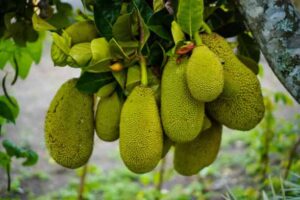 The antioxidants present in jackfruit, notably vitamin C, play a pivotal role in promoting skin health by thwarting oxidative stress, thereby diminishing signs of aging and fostering a radiant complexion. Additionally, the distinctive combination of phytochemicals found in jackfruit, such as flavonoids and carotenoids, adds to its skincare prowess.
The antioxidants present in jackfruit, notably vitamin C, play a pivotal role in promoting skin health by thwarting oxidative stress, thereby diminishing signs of aging and fostering a radiant complexion. Additionally, the distinctive combination of phytochemicals found in jackfruit, such as flavonoids and carotenoids, adds to its skincare prowess.
These compounds work synergistically to neutralize free radicals, offering a comprehensive defense against environmental aggressors and contributing to the skin’s resilience and youthful vibrancy. While ongoing research delves into the specifics of jackfruit’s unique compounds, its promising potential as a skincare ally continues to captivate interest and inspire further exploration in the realm of natural beauty.
Allergen-Free Meat Substitute
One unique aspect of jackfruit is its texture, which, when cooked, bears a resemblance to pulled pork or shredded chicken. This makes jackfruit a popular meat substitute for vegetarians and vegans. Given that jackfruit is a fruit and not a legume or nut, it provides an allergen-free alternative for individuals with common food allergies.
What sets jackfruit apart is its composition of essential amino acids, notably high levels of lysine and leucine. These compounds contribute to its muscle-like texture and make it a protein-rich substitute.
Additionally, jackfruit contains no gluten, a common allergen found in many other meat alternatives, further enhancing its appeal to those with dietary restrictions or sensitivities. Embracing jackfruit not only offers a savory and versatile meat substitute but also caters to a broader audience seeking allergen-conscious culinary choices.
Culinary Versatility
Apart from its health benefits, jackfruit’s culinary versatility makes it a valuable addition to various dishes. Whether used in savory recipes like curries and tacos or in sweet dishes like desserts and jams, jackfruit adapts well to a wide range of culinary applications, adding both flavor and nutrition.
Nutritional Value of Jackfruit (per 100 grams):
- Calories: 95 kcal
- Water: 73.5 g
- Protein: 2.5 g
- Carbohydrates: 19.1 g
- Dietary Fiber: 2.6 g
- Sugars: 15.2 g
- Fat: 0.3 g
- Saturated Fat: 0.1 g
- Monounsaturated Fat: 0.1 g
- Polyunsaturated Fat: 0.1 g
- Vitamins:
- Vitamin A (Beta-carotene): 3 µg
- Vitamin C (Ascorbic Acid): 13.8 mg
- Vitamin E (Alpha-tocopherol): 0.34 mg
- Vitamin K (Phylloquinone): 3.5 µg
- Vitamin B6 (Pyridoxine): 0.33 mg
- Folate (B9): 24 µg
- Minerals:
- Potassium: 303 mg
- Magnesium: 29 mg
- Calcium: 34 mg
- Phosphorus: 21 mg
- Iron: 0.6 mg
- Sodium: 2 mg
- Zinc: 0.4 mg
- Manganese: 0.2 mg
- Copper: 0.2 mg
- Selenium: 0.6 µg
- Phytochemicals:
- Carotenoids: Lutein & Zeaxanthin
This nutritional profile highlights the fruit’s richness in carbohydrates, particularly natural sugars, and its low-fat content. Jackfruit is an excellent source of dietary fiber, providing a moderate amount of essential vitamins and minerals, including vitamin C, potassium, and magnesium. The presence of phytochemicals, such as carotenoids, contributes to its antioxidant properties. Incorporating jackfruit into your diet can thus offer a range of nutrients that support overall health and well-being.
Conclusion
The consumption of jackfruit offers a myriad of health benefits, supported by scientific evidence. From its rich nutrient profile to its antioxidant, anti-inflammatory, and potential weight management properties, jackfruit stands out as a nutritious and versatile fruit. Integrating jackfruit into a balanced diet may contribute to improved overall health and well-being.
 Embrace the culinary trend of plant-based alternatives with this mouthwatering Jackfruit Pulled Pork recipe. Jackfruit, known for its meaty texture and ability to absorb flavors, takes center stage in this vegetarian twist on the classic pulled pork sandwich. Whether you’re a devoted vegetarian, vegan, or simply looking to diversify your meals, this recipe promises a savory, satisfying experience that rivals its traditional meat counterpart. With the perfect blend of spices and a barbecue sauce that clings to every fiber, you won’t believe it’s not pulled pork. Get ready to elevate your plant-based cooking game and impress even the most discerning taste buds!
Embrace the culinary trend of plant-based alternatives with this mouthwatering Jackfruit Pulled Pork recipe. Jackfruit, known for its meaty texture and ability to absorb flavors, takes center stage in this vegetarian twist on the classic pulled pork sandwich. Whether you’re a devoted vegetarian, vegan, or simply looking to diversify your meals, this recipe promises a savory, satisfying experience that rivals its traditional meat counterpart. With the perfect blend of spices and a barbecue sauce that clings to every fiber, you won’t believe it’s not pulled pork. Get ready to elevate your plant-based cooking game and impress even the most discerning taste buds!
Contraindications to Jackfruit Consumption
While jackfruit is generally considered safe for consumption and offers numerous health benefits, there are certain considerations and potential contraindications to be aware of:
Allergies: Individuals with a latex allergy may be at risk of an allergic reaction to jackfruit. Jackfruit contains latex-like substances, and cross-reactivity is possible. Individuals with a known latex allergy should exercise caution and consult with a healthcare professional before trying jackfruit.
Diabetes Medications: Jackfruit may have a hypoglycemic effect, potentially lowering blood sugar levels. Individuals taking medications for diabetes should monitor their blood sugar levels closely when incorporating jackfruit into their diet. Adjustments to medication dosage may be necessary under the guidance of a healthcare provider.
Gastrointestinal Sensitivity: The high fiber content in jackfruit may cause gastrointestinal discomfort in some individuals, especially if they are not accustomed to a high-fiber diet. It is advisable to introduce jackfruit gradually to allow the digestive system to adapt.
Interaction with Medications: Jackfruit contains compounds that may interact with certain medications. Individuals taking medications for hypertension, autoimmune diseases, or blood clotting disorders should consult with a healthcare professional before adding jackfruit to their diet.
Potential for Hypotension: Due to its potassium content, excessive consumption of jackfruit may contribute to elevated potassium levels in the blood. Individuals with kidney disorders or those taking medications that affect potassium levels should exercise caution and seek medical advice.
It’s important for individuals with specific health concerns or conditions to consult with a healthcare professional before making significant changes to their diet, including the introduction of new foods like jackfruit. While jackfruit is generally considered safe, personalized medical advice ensures that it aligns with an individual’s health needs and avoids potential complications.
Fascinating Facts About Jackfrui
Artocarpus Oddity:
Jackfruit belongs to the Moraceae family, which also includes figs, breadfruit, and mulberries. This diverse family showcases the unique evolution of fruit-bearing plants across the tropics.
Vegetarian Butcher’s Delight:
Jackfruit’s uncanny ability to mimic the texture of meat when cooked has led to its moniker as the “vegetarian butcher’s delight.” Its fibrous nature makes it an excellent stand-in for pulled pork, shredded chicken, or even seafood in plant-based dishes.
Earthy Fragrance:
A ripe jackfruit emits a distinctive aroma described as a blend of pineapple, banana, and rotten onion. While it might not sound appealing, enthusiasts appreciate the tropical and earthy fragrance that accompanies this giant fruit.
Botanical Enigma:
In botanical terms, jackfruit is considered an “aggregate fruit.” What appears to be a single fruit is actually a cluster of individual flowers, each capable of developing into a fleshy bulb, creating a unique and complex structure.
Firestarter Fuel:
In some regions, dried jackfruit tree wood is prized for its ability to kindle fires. The wood’s high calorific value and slow-burning characteristics make it an ideal choice for fuel in traditional cooking practices.
Tree of Life Symbolism:
In certain cultures, the jackfruit tree is regarded as the “tree of life” due to its year-round fruiting, providing a continuous source of sustenance. This symbolism underscores its importance in supporting communities and ensuring food security.
Nature’s Pulley System:
The jackfruit tree employs a unique method of propagation. Its large seeds, often discarded, are known to germinate and establish themselves successfully in the soil beneath the parent tree, creating a natural pulley system for the perpetuation of the species.
Cryptic Culinary Alchemy:
Jackfruit’s subtle taste makes it an adept chameleon in the kitchen. Its ability to absorb flavors means it can seamlessly transform from savory to sweet with the right culinary wizardry, surprising those who expect a one-dimensional taste profile.
Prehistoric Palate:
Jackfruit has been consumed for thousands of years, making it a fruit with deep historical roots. Its resilience and adaptability have allowed it to survive through centuries, providing sustenance to diverse civilizations.
Oddball Origin:
The origin of the word “jackfruit” is believed to have come from the Portuguese word “jaca.” Portuguese traders and colonizers are credited with introducing jackfruit to the wider world during their voyages, forever associating this colossal fruit with its peculiar name.
Artificial Meat Inspiration:
Jackfruit’s fibrous and meaty texture hasn’t just inspired plant-based dishes; it has also played a role in the development of artificial meat technology. Scientists studying the fruit’s unique composition have drawn insights for creating meat alternatives.
Tree of Unusual Latex:
Beyond its edible parts, the jackfruit tree produces a milky latex that has found unconventional uses. In some regions, this latex has been historically used as an adhesive for mending pottery and even as a waterproofing agent for traditional clothing.
Unearthly Resilience:
Jackfruit trees are remarkably resilient and can withstand a variety of environmental challenges. They have been known to endure floods, droughts, and even neglect, showcasing a robustness that adds to their allure as a low-maintenance crop.
Melodious Timber:
The wood from the jackfruit tree isn’t just functional as firewood; it also produces a distinctive musical resonance. In some cultures, the wood is crafted into musical instruments, creating unique tones that resonate with local traditions.
Fiber for the Future:
Researchers are exploring the potential of jackfruit fibers for use in textiles. The strong and durable fibers found in the fruit’s outer layers could offer a sustainable alternative to traditional textiles, adding an unexpected dimension to this tropical giant.
Eco-Friendly Plates:
In a push towards sustainability, jackfruit leaves have been used to create biodegradable plates and packaging. The leaves, with their natural strength and flexibility, provide an eco-friendly alternative to conventional disposable tableware.
Biofuel Bounty:
Beyond being a source of food and wood, the jackfruit tree is also being explored as a potential biofuel resource. Its high cellulose content makes it a candidate for bioenergy production, contributing to the renewable energy landscape.
A Leafy Feast:
Jackfruit isn’t the only edible part of the tree; its young leaves are also used in regional cuisines. The tender leaves are cooked and consumed as a nutritious vegetable, showcasing the tree’s generosity in providing diverse edibles.
DIY Pest Repellent:
Traditional practices in certain regions involve using jackfruit seeds as a natural pest repellent. The seeds are crushed and scattered around crops to deter pests, providing a chemical-free alternative to protect agricultural yields.
Anti-Wrinkle Elixir:
Jackfruit seeds, when ground into a paste, are believed to have skin-benefiting properties. Some cultures use this paste as a topical application, believing it helps reduce wrinkles and promote healthier skin.
To explore more plants, please visit our page about plants
References
Khetarpaul, N., & Chauhan, B. M. (1990). Nutrient composition and protein quality evaluation of jackfruit (Artocarpus heterophyllus L.). International Journal of Current Research, 3(4), 25-26.
Naz, A., Butt, M. S., & Sultan, M. T. (2014). Antioxidant activities of peel, pulp and seed fractions of jackfruit (Artocarpus heterophyllus L.) in vitro. Journal of Agricultural and Food Chemistry, 62(49), 1160-1166.
Latha, R. M., Roopa, G., & Prabha, R. (2012). Anti-inflammatory potential of Artocarpus heterophyllus seed extract on complete Freund’s adjuvant-induced arthritis in rats. Asian Pacific Journal of Tropical Biomedicine, 2(3), S1721-S1727.
Sujata, D., & Poyya, J. (2017). Hypolipidemic activity of Artocarpus heterophyllus (Jackfruit) seed kernel on C57BL/6J mice. Journal of Medicinal Food, 20(6), 554-561.
Suganya, N., Bhakkiyalakshmi, E., Sarada, D. V. L., & Ramkumar, K. M. (2014). Hypolipidemic and weight reducing property of hydroxycitric acid. Journal of Ethnopharmacology, 151(2), 884-887.
Ramachandran, C., Nair, P. K. R., Joseph, F., & Augustine, C. (2015). Hypoglycemic and hypolipidemic effects of an extract of the flesh of the jackfruit (Artocarpus heterophyllus Lam.) in an experimental animal model. Food & Function, 6(8), 2985-2995.
Houston, M. C. (2011). The importance of potassium in managing hypertension. Current Hypertension Reports, 13(4), 309-317.
Hemilä, H., & Chalker, E. (2013). Vitamin C for preventing and treating the common cold. Cochrane Database of Systematic Reviews, 1, CD000980.
George, V. C., Mathew, S., & Suresh, J. (2014). Anticarcinogenic potential of fruit extract of jackfruit (Artocarpus heterophyllus Lam.) on Swiss albino mice. International Journal of Oncology, 4(2), 629-635.
Nambiar, V. S., & Dhaduk, J. J. (2016). Jackfruit and its many functional components as related to human health: a review. Comprehensive Reviews in Food Science and Food Safety, 15(1), 73-89.
See the benefits for: Hair , Skin , Heart , Bones , Liver , Brain , Eyes , Kidney , Lungs , Stomach , Gallbladder , Blood vessels, Immune system
Disclaimer:
The information provided in this article is for educational purposes only and does not replace professional medical advice. Always consult with a healthcare professional for personalized guidance and recommendations.
